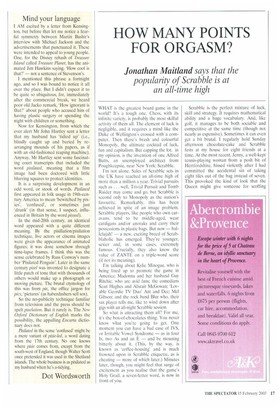Mind your language
I AM excited by a letter from Kensington, but before that let me notice a fear
ful symmetry between Martin Bashir's interview with Michael Jackson and the advertisements that punctuated it. These were intended to appeal to young people. One, for the Disney rehash of Treasure Island called Treasure Planet, has the animated Jim Hawkins saying, 'How cool is that?' — not a sentence of Stevenson's.
I mentioned this phrase a fortnight ago, and so I was bound to notice it all over the place. But I didn't expect it to be quite so ubiquitous, for, immediately after the commercial break, we heard
poor old Jacko remark, 'How ignorant is that?. about people who accused him of having plastic surgery or spending the night with children or something.
Now for Kensington, from which the ever alert Mr John Hartley sent a letter that my husband has 'tidied up' (i.e., blindly caught up and buried by rearranging mounds of his papers, as if with an old-fashioned reaping machine).
Anyway, Mr Hartley sent some fascinating court transcripts that included the word pixilated, meaning that a film image had been doctored with little blurring squares to protect identities.
It is a surprising development in an odd word, or stook of words. Pixilated first appeared in folk usage in 19th-century America to mean 'bewitched by pixies', 'confused', or sometimes just 'drunk' (in that sense, I suspect, influenced in Britain by the word pissed).
In the mid-20th century, an identical word appeared with a quite different meaning. By the pixillation/pixilation technique, live actors or cinema images were given the appearance of animated figures; it was done somehow through time-lapse frames. I think this was the sense celebrated by Russ Conway's num ber Pixilated Penguin'. Later in the same century pixel was invented to designate a little patch of tone that with thousands of others would make up a photograph or moving picture. The brutal etymology of this was from pix, the office jargon for pies, 'pictures' (as haberdashers sell sox).
So the no-publicity technique familiar from television and the press should be
spelt pixelation. But it rarely is. The New Oxford Dictionary of English marks the possibility, the appalling Encarta dictionary does not.
Pixilated in the sense 'confused' might be a mere variant of pixie-led, a word dating from the 17th century. No one knows where pixie comes from, except from the south-west of England, though Walter Scott once pretended it was used in the Shetland islands. The whole business is as pixilatecl as my husband when he's a-tidying.
Dot Wordsworth


































































 Previous page
Previous page